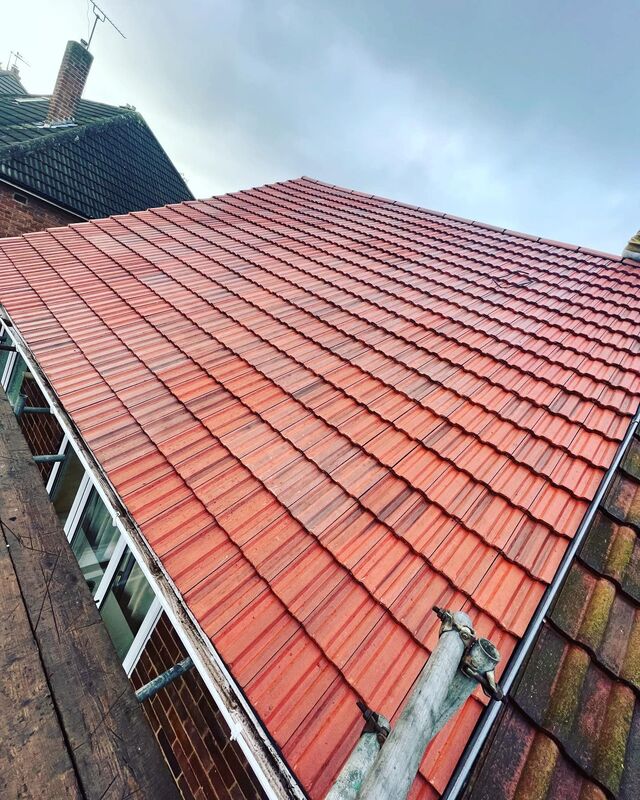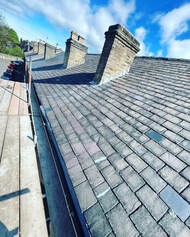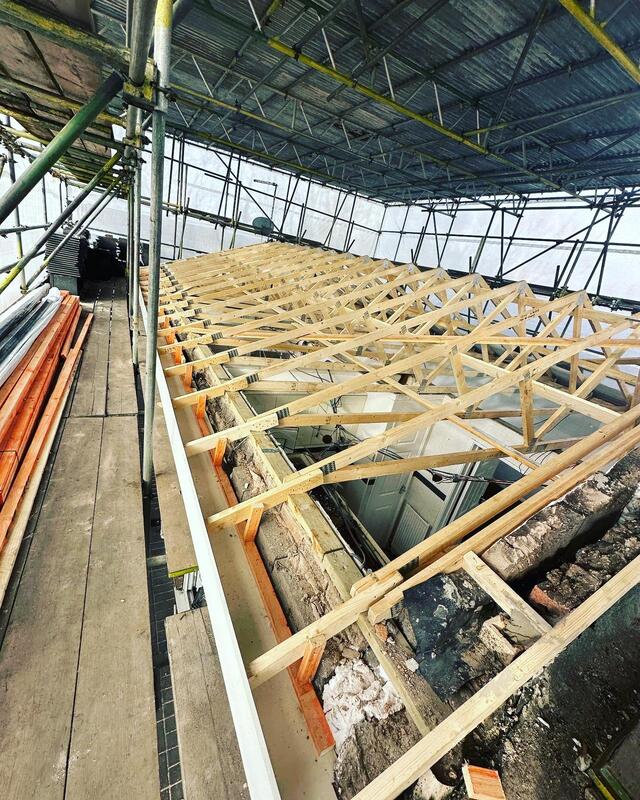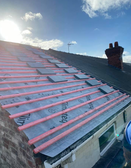|
When planning an extension to your home, one of the crucial decisions you'll face is choosing between a flat or pitched roof. Each type has its own set of advantages and disadvantages that can significantly impact the aesthetics, functionality, and cost of your project. To help you make an informed choice, this article will delve into the characteristics of both flat, pitched and lean-to roofs, considering the pro's and cons of each for your extension. Understanding Flat Roofs Flat roofs, despite their name, are not entirely flat. They have a slight pitch (usually between 1-10 degrees) to allow water drainage. Here are some key points to consider: Advantages of Flat Roofs:
Understanding Pitched Roofs Pitched roofs are the more traditional choice in the UK, characterised by their steep angles. Here's what you need to know: Advantages of Pitched Roofs:
Understanding Lean-to Roofs
Lean-to roofs are a subtype of pitched roofs. They consist of a single slope that leans against an existing building, making them ideal for smaller extensions. Here's what you need to know: Advantages of Lean-to Roofs:
Disadvantages of Lean-to Roofs:
Making Your Decision: When deciding between a flat, pitched, or lean-to roof for your extension, consider the following factors: Architectural Style: Consider the existing architecture of your home. Pitched and lean-to roofs often blend seamlessly with traditional UK homes, while flat roofs can enhance modern or minimalist designs. Budget: Evaluate your budget constraints. Flat roofs can offer a cost-effective solution initially, but consider the potential for higher maintenance costs over time. Lean-to roofs are generally more affordable than full pitched roofs and can be a good compromise between cost and functionality. Purpose and Use: Think about how you intend to use the space. If you’re looking to create an additional outdoor area or install solar panels, a flat roof may be more beneficial. Conversely, if you need more interior space, a pitched roof can provide valuable loft space. Lean-to roofs are ideal for smaller, functional extensions without requiring a major overhaul. Building Regulations and Planning Permissions: Always check local building regulations and planning permissions. Some areas may have restrictions on the type of roof you can build based on aesthetic or environmental guidelines. Conclusion Choosing the right roof type for your extension is a balance of practicality, aesthetics, and budget. Both flat and pitched roofs, including lean-to designs, offer unique benefits and come with their own set of challenges. By carefully considering your specific needs and circumstances, you can make an informed decision that enhances your home’s value and functionality. Whether you opt for the modern appeal of a flat roof, the classic durability of a pitched roof, or the simplicity of a lean-to roof, the key is to plan thoroughly and consult with experienced professionals to ensure a successful extension project. For help with planning your roof extension, call our Roofers Sheffield team today. When it comes to home renovations, few projects are as significant or vital as installing a new roof. Not only does a sturdy roof protect your home from the elements, but it also adds to its aesthetic appeal and resale value. However, with the multitude of roofing materials and installation methods available, finding the most cost-effective option can be a daunting task. So, what is the best approach to ensure you get a new roof that meets your needs without breaking the bank? Let's delve into some key considerations.
Material Selection Traditional options like slate and clay tiles have long been popular choices for their durability and weather resistance, making them suitable for properties in South Yorkshire. Additionally, modern alternatives like concrete tiles and synthetic slate offer excellent longevity and protection against the elements, albeit at varying price points. Consulting with local roofing experts such can help you choose the most suitable material for your specific property and budget. In addition, many local roofing contractors will be able to benefit from trade prices and bulk purchase discounts which can all help with reducing the cost of your new roof. Recycling Old Materials In many cases, old roof tiles can be recycled whilst still offering excellent longevity and weather protection for your roof. One option for your roof replacement is to ask your roofing contractor if they can salvage and reuse the good tiles from your roof. This will cut down on material costs, saving you precious amounts on the cost of your new roof. Just keep in mind that the appearance of your roof may be impacted due to the presence of old tiles against new tiles. If these can be hidden in areas of the roof that are not visible from the ground, then the visual impact will be reduced. Quality Installation The expertise and experience of roofing contractors can significantly impact the cost-effectiveness and longevity of your new roof. Opting for local professionals who are well-versed in UK building regulations and weather patterns ensures that your roof is installed to the highest standards. A high quality local contractor like Roofers Sheffield can recommend the most cost-effective solutions tailored to your property's needs. While it may be tempting to cut costs by hiring non-specialised labour, investing in skilled professionals pays dividends in the form of a durable and long-lasting roof. Energy Efficiency Considerations With rising energy costs, UK homeowners are increasingly seeking ways to improve energy efficiency and reduce utility bills. When installing a new roof, consider energy-efficient options and use it as an opportunity to upgrade your loft or flat roof insulation. While this may come at a higher higher upfront cost, the long-term savings on heating and bills can make this a cost effective long term decision. Maintenance and Lifespan Considerations Choosing a roofing material with minimal upkeep requirements can save both time and money in the long run. Materials like concrete and synthetic tiles typically require less maintenance compared to traditional options like slate, which may need periodic inspections and repairs. In addition, the cost of sourcing replacement slates can be more expensive. By opting for a low-maintenance roof with a long lifespan, you can enjoy peace of mind knowing that your investment will provide reliable protection for years to come. Warranty Coverage and Compliance: When investing in a new roof, it's essential to ensure that both the materials and installation are covered by comprehensive warranties. Reputable roofing manufacturers and contractors often provide warranties that cover defects, installation errors, and other issues that may arise. Additionally, verifying compliance with UK building regulations and standards is crucial to avoid potential legal and financial implications down the line. By choosing certified roofing materials and working with NFRC accredited contractors like Roofers Sheffield, you can rest assured that your new roof meets all regulatory requirements and is backed by reliable warranty coverage. In conclusion, the most cost-effective way to install a new roof for your property involves careful consideration of the material selection, quality of installation by local professionals, energy efficiency, maintenance requirements, and warranty coverage. By partnering with experienced roofing experts who understand the unique challenges of installing a new roof, you can ensure that your new roof provides optimal protection, longevity, and value for money. For help with your roof installation, call our Roofers Sheffield team today. When it comes to home improvement projects, few are as vital as ensuring the integrity of your roof. Whether you're facing repairs, replacements, or new installations, choosing the right roofing contractor is crucial for the safety, durability, and aesthetics of your home. Luckily, within Sheffield, there are many different roofing companies in existence, but for customers needing work doing, we know this can be overwhelming. So, how do you know which roofing contractor to choose for your needs? In this article, we go over some top tips for finding and selecting the right roofing contractor for your property. Do your research Start by carrying out a quick online search. A simple Google Search for some related search terms such as 'Roofers Sheffield', 'Roofers in Sheffield' or 'Roofers Near Me', will bring results relevant to your local area. We recommend to shortlist 5 companies by reviewing their online presence. Ask yourself questions such as: do they have a professional appearance online, are they responsive to customer reviews and questions on their online profiles, do they offer the services you are looking for, do they have photos of previous projects, do they have positive reviews? In addition to searching online, you can also ask friends, family and neighbours if they have used any roofers previously and if they would recommend them. This will help to give you confidence that someone you know has used them in the past. Verify Insurance Before engaging with any roofing contractor, ensure they are properly insured. A legitimate company should have the necessary insurance to work on your property. Verify that they carry adequate liability insurance and workers' compensation coverage to protect you from any potential liabilities or accidents during the project. Experience and Expertise Assess the experience and expertise of the roofing contractors you're considering. Look for companies with a proven track record of successful projects and extensive experience working with various roofing materials and styles. A seasoned contractor will possess the skills and knowledge required to tackle any roofing challenge effectively. You should be able to get an idea of the expertise of the roofing company during your initial interaction and roof survey. Make sure they are confident in diagnosing the problem and present a reasonable solution. Verify this with other roofing contractors, by selecting 3-5 roofers to assess the problem. If all are giving the same or similar diagnosis, then you can be confident knowing what the issue is. Request references or evidence of previous jobs If your work is particularly high value or substantial, such as a whole roof replacement, then it is worth seeking out references from previous customers. Online reviews can help with this, but if you require more detail, ask the company for references from past customers or a portfolio of past work as evidence. Don't settle for one quote Unless the work is an emergency, then we always advise to get 3-5 quotes. This allows you to obtain a competitive rate for the work and ensures you get opinions from various contractors. Be mindful that the cheapest quote is not necessarily the one you should go for. Consider the entire package including, customer service, experience, price, warranty and aftercare. Reliability and Service A reputable company will be reliable. If they arrange an appointment with you, then they will turn up at the time stated, or provide regular updates if they cannot stick to the appointment time. A good company will also offer excellent customer service. Staff should speak to you with respect and take care when working on your property. If you are not satisfied with either the reliability or customer service, then it is best to find a different company. Health and Safety A good roofing contractor will put the necessary health and safety procedures in place to ensure that neither you, your family, or their staff are put at undue risk when working on your roof. If you are unsure, ask the roofing company how they intend to safely manage your work and access on your roof. Remember that most roofing jobs, unless short duration, will require scaffolding to be done safely. If your roofer is intending to do all work off a ladder, this is a red flag. Conclusion By following the tips outlined above and conducting thorough research, you can feel confident in your decision when choosing a roofing contractor in Sheffield. Remember to prioritise quality, reliability, and professionalism to ensure your roofing project is completed to the highest standards. Investing in a reputable roofing company will provide you with peace of mind and protect your home for years to come. For a team you can rely on, contact our friendly Roofers Sheffield team today. We can provide you with honest, expert advice, ensuring your job gets done right first time. When it comes to maintaining the integrity of your home, few elements are as crucial as a sturdy, weather-resistant roof. With the unpredictable British weather ranging from heavy rain to strong winds, your roof plays a vital role in protecting your property from the elements. But is investing in a new roof truly worth it for homeowners? Let's explore this question while considering the unique aspects of roofs in Sheffield.
Consider The Age of Your Roof First and foremost, it's essential to consider the age and condition of your current roof. In Sheffield, many roofs are constructed using materials such as slate, rosemary clay, or concrete tiles, which can have varying lifespans depending on factors like maintenance, quality of installation and weather exposure. If your roof is showing signs of wear and tear, such as cracked or missing tiles, damp patches, or sagging areas, it may be time to consider investing in a replacement. Repair vs Replacement If you are spending more and more money on roof repairs, then it could be time for a new roof. The process of carrying out repeated repairs on your roof can become expensive and impact the aesthetic appearance of your roof. In addition, patch repairs may not be as effective at preventing leaks as a new roof will be. Property Value If you are considering selling your home, then a new roof can help to improve property value. One of the factors taken into consideration during a home buyer's survey, is the condition of the roof. If the roof is highlighted as having problems, most potential buyers will seek a reduction in asking price on the property to account for the work required to the roof. A new roof will help to prevent reductions in your home's sell on value and in some cases, it will even add to it. Value for money Whilst the upfront cost of a new roof may be high, if you plan to stay in your home for a number of years, then the long term value for money on a new roof should not be understated. Most pitched tile roofs in Sheffield have a lifespan of 50-60 years. With the average cost of a pitched roof being in the region of £8,000, that works out to be less than £150 per year for the lifecycle of the roof. When you factor the cost of inflation, this works out to be seriously impressive long term value for money. Reduced Energy Bills Upgrading to a new roof can lead to improved energy efficiency, which is particularly important in the UK's climate. Many older roofs lack adequate insulation, allowing heat to escape during the colder months and driving up energy bills. By installing a new roof with proper insulation and ventilation, you can create a more energy-efficient home, reducing heat loss and saving money on heating costs over time. Warranties A new roof installed by a reputable roofing contractor will generally come with a warranty on workmanship for at least 20-25 years. This means that you will be covered in the event that your roof has any problems within the warranty period, so you will be saving additional money, time and stress. Improved Property Aesthetics In addition to practical considerations, investing in a new roof can also enhance the aesthetic appeal and value of your UK home. Whether you choose traditional slate or clay tiles for a classic look, or select modern materials like composite tiles or rubber roofing for a contemporary feel, a new roof can transform the appearance of your property and increase its curb appeal. This is especially important if you're considering selling your home, as a well-maintained roof can make a positive impression on potential buyers and contribute to a higher resale value. Summary Of course, the decision to invest in a new roof is not one to be taken lightly, as it represents a significant financial commitment. However, when weighing the costs against the long-term benefits, it's important to consider the potential savings and advantages of a new roof for your home. Not only can it provide better protection against the elements and improve energy efficiency, but it can also enhance the overall value and appearance of your property. When considering a new roof for your Sheffield home, it's essential to work with a reputable roofing contractor who has experience working with the unique challenges of roofs in Sheffield. A professional roofer can assess the condition of your current roof, recommend the best materials for your needs and budget, and provide accurate cost estimates for the project. Additionally, be sure to inquire about warranties and guarantees offered by the roofing company to ensure your investment is protected for years to come. For help with your new roof, contact the Roofers Sheffield team today Your roof is one of the most critical components of your home, providing protection from the elements and ensuring the safety and comfort of your family. Over time, however, even the most durable roofs can show signs of wear and tear. Deciding when it's the right time to replace your roof is a crucial decision that requires careful consideration. In this blog post, we'll explore the key factors to help you determine whether it's time to invest in a new roof, brought to you by Roofers Sheffield, your trusted partners in roofing solutions. Age of the Roof One of the primary indicators that it may be time to replace your roof is its age. The typical lifespan of a roof can vary depending on the materials used. Asphalt shingles, for example, generally last between 20 to 30 years, while metal roofs can endure for 50 years or more. If your roof is nearing the end of its expected lifespan, it's wise to start assessing its condition and considering replacement options. Visible Signs of Damage Inspecting your roof for visible signs of damage is a crucial step in the decision-making process. Look for missing or damaged shingles, sagging areas, or signs of water damage such as dark spots on the ceiling. Damaged flashing around chimneys or vents can also contribute to leaks and compromise the integrity of your roof. If you notice any of these issues, it's essential to address them promptly to prevent further damage to your home's structure. Water Leaks and Interior Damage Water leaks are a clear indication that your roof may be compromised. If you observe water stains on your ceiling, peeling paint, or mould growth in your attic, it's crucial to investigate the source of the problem. Leaks can lead to structural damage and pose health risks due to mould growth. If repairs are no longer a viable solution, a roof replacement may be the most effective way to safeguard your home. Energy Efficiency Concerns An aging or damaged roof can contribute to decreased energy efficiency in your home. Insufficient insulation or damaged roofing materials can result in increased energy bills as your heating and cooling systems work harder to maintain a comfortable indoor temperature. Upgrading to energy-efficient roofing materials during a replacement can not only enhance the longevity of your roof but also contribute to long-term cost savings. Cracked or missing tiles Cracked or missing tiles are a clear sign that your roof is nearing the end of its life. This can occur due to weathering, moisture absorption, or improper installation. When tiles begin to crack, they become less effective at protecting your home from the elements. If a significant portion of your roof exhibits this issue, it's time to consult with roofing professionals to discuss replacement options. Conclusion Deciding when it's the right time to replace your roof is a decision that requires a thorough assessment of its age, visible damage, leaks, energy efficiency, and the condition of shingles. Neglecting the signs of an aging or damaged roof can lead to more extensive and costly issues down the road. Roofers Sheffield understands the importance of a reliable and durable roof in ensuring the well-being of your home and family. If you're unsure about the condition of your roof or if it's time for a replacement, reach out to our experienced team for a comprehensive inspection and expert guidance on the best roofing solutions for your needs. Investing in a new roof today can provide peace of mind and protect your home for years to come. With Sheffield currently in the eye of Storm Pia, there has never been a better time to discuss the importance of making sure your roof is protected against storm damage.
In the face of storms, your roof becomes the frontline defender, taking the brunt of nature's fury. Protecting your roof against storm damage is not only a matter of preserving your property but also ensuring the safety and security of your family. In this comprehensive guide, we'll explore practical strategies to fortify your roof and minimise the risks associated with storms. Start with a Solid Foundation: Roof Inspection The first line of defence against storm damage is a thorough roof inspection. Regularly assess the condition of your roof, paying attention to tiles, flashing, and the overall structure. Look for signs of wear and tear, such as loose or missing tiles, damaged flashing, and weakened areas. Addressing these issues promptly can prevent them from escalating into major problems during a storm. Consider hiring a professional roofing contractor for a detailed inspection, especially before the winter season hits. Choose Resilient Roofing Materials The materials you choose for your roof play a crucial role in its ability to withstand storm damage. At Roofers Sheffield, we only use resilient roofing materials that are designed to endure harsh weather conditions. Concrete, clay and slate tiles are our popular go-to choices known for their durability. Secure Roof Decking and Reinforce Connections The decking beneath your flat roofing material provides structural support to your roof. Ensure it is securely installed and adequately supported. Consider reinforcing connections with quality fasteners to enhance the overall strength of your roof. Strengthening the roof decking minimises the risk of structural damage during high winds and heavy storms. In areas prone to high wind uplift forces, it may be necessary to mechanically fix any insulation boards to your flat roof decking. Install Gable Straps Gable straps, also known as roof truss straps or tie-downs, are metal connectors that secure your roof to the structure your property. These straps significantly enhance your roof's resistance to uplift forces. Work with a professional roofing company to install roof straps properly, ensuring they are attached to both the roof and the walls of your home. Maintain Trees and Landscaping Overhanging branches and untrimmed trees can pose a significant threat to your roof during storms. Regularly trim branches and remove dead or weak trees that could potentially fall onto your roof. This proactive approach not only protects your roof but also enhances the overall safety of your property during severe weather. Ensure Proper Ventilations Ventilation is crucial for maintaining your roof's health during storms. Inadequate ventilation can lead to moisture build-up, which may weaken the structure and contribute to mould growth. Install roof vents to facilitate air circulation, reducing the risk of damage caused by trapped moisture. Reinforce Gable Ends and Eaves Gable ends and eaves are vulnerable areas during storms, especially high winds. Reinforce these sections with braces or retrofit them with additional support to minimise the risk of wind-driven damage. Consider installing protective coverings or screens to shield vulnerable openings and prevent debris from entering. Upgrade Fascias and Soffits Soffits and fascias help to protect your roof from driving rain and high winds. Your fascias and soffits may easily become damaged or loose during periods of storms. Make sure these elements are fastened back to your roof structure correctly to provide additional rigidity and protection against the elements. Consider upgrading old fascias and soffits to aluminium or upvc to provide a robust, durable and low maintenance option. Conclusion Protecting your roof against storm damage is a proactive and essential responsibility for homeowners. By adopting these strategies, you not only safeguard your property but also ensure the well-being of your family during adverse weather conditions. Remember that preventative measures and timely maintenance can significantly reduce the impact of storms on your roof, providing you with peace of mind and the confidence that your home can weather any storm that comes its way. If you need help protecting and repairing your roof from storm damage, contact Roofers Sheffield today |
AuthorRoofers Sheffield - your leading roofing company in South Yorkshire Archives
April 2024
Categories |






 RSS Feed
RSS Feed